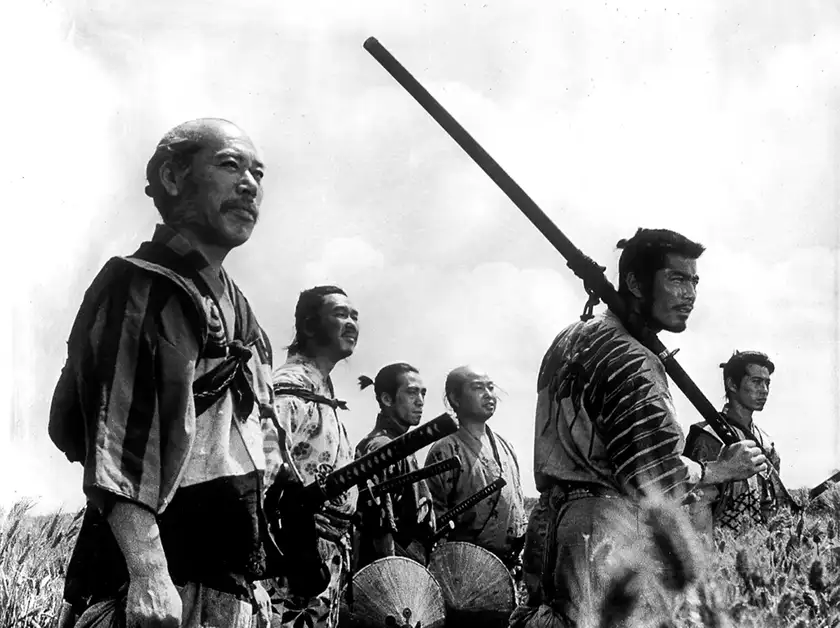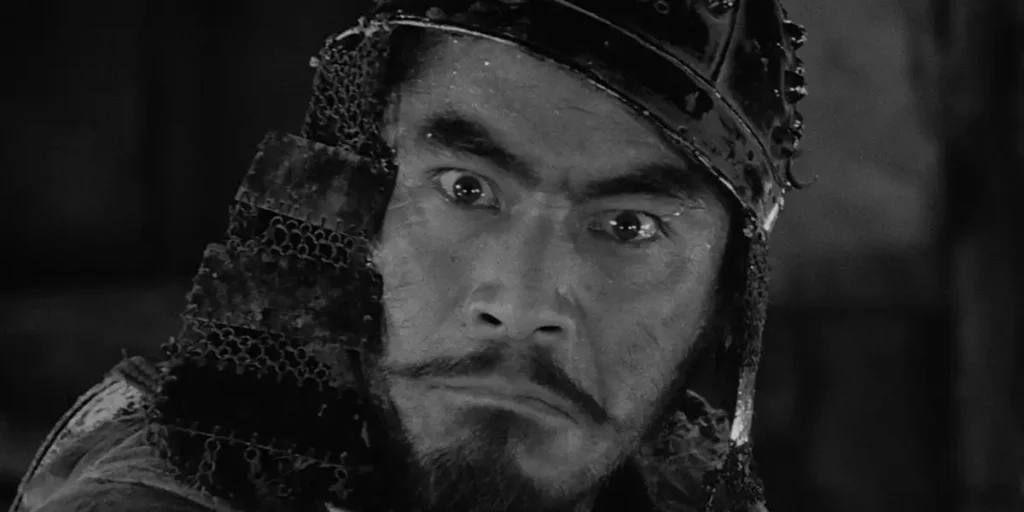Akira Kurosawa’s Seven Samurai is back in theaters with a 4k restoration for its 70th anniversary, and the action masterpiece hasn’t lost any of its ability to thrill.
Director: Akira Kurosawa
Run Time: 207′
U.S. Release: July 5, 2024 in select theaters
U.K. Release: September 26, 2024 in select cinemas; October 21 on 4K UHD & Blu-ray
Seven Samurai, directed by Akira Kurosawa, is celebrating its 70th anniversary with a special 4k restoration from Tōhō studios. If you can, watching the movie’s steely, pristine 4k print in a theater is absolutely worth your time; it will allow you the opportunity to get swallowed into Kurosawa’s world, feel the thrills, and witness its timeless qualities. True entertainment never stops being entertaining.
Seven Samurai is one of the crown jewels of cinema, a movie that could be screened for visiting aliens in order to show what the art form can achieve. The film is a frequent sight on “greatest of” lists: it even placed number 20 on Sight and Sound’s Greatest Films of All Time List in 2024. Seven Samurai is a revered and influential work, a sign post of trail of film history that led to later movies. As Japanese film expert Michael Jeck explained in a commentary track recorded for the Criterion Collection, Seven Samurai was the first movie to feature the recruiting and assembling of a team. The movie has been remade as the western The Magnificent Seven and influenced countless films, including A Bug’s Life, The Avengers, Star Wars, Rogue One, Ocean’s Eleven, Sholay, Justice League, Galaxy Quest, and Mad Max: Fury Road.
Yet, for all the time it is taught in film school and discussed by critics, Seven Samurai is not an “eat your vegetables, they’re good for you” movie. The film’s influence and enduring reputation is due to its success as a piece of pure entertainment. It is the shortest 207 minute movie ever made. Kurosawa directs with a vigorous high energy that gives a constant propulsive sense of motion. You feel wind in your hair as you are watching. It is not just the characters that go on an adventure, but the viewer as well.
The basic plot of Seven Samurai is a simple piece of folklore, inspired by Kurosawa’s love of the Westerns made by John Ford and Howard Hawks. In 1586, during the Sengoku period, a time marked in Japanese history by civil wars and chaotic upheaval, a small peasant village is terrorized by a gang of bandits. Year after year the bandits ride into the village and make off with the harvest, killing all those who oppose them. In order to avoid destruction and starvation, the villagers come up with a plan to hire samurai to protect them from the bandits, paying the samurai in food.
“Find hungry samurai,” the village elder advises. “Even bears come down from the mountain when they’re hungry.” A delegation of four peasants are sent to a nearby town where they encounter the noble, aging ronin Kanbei (Takashi Shimura). Touched by the humility of the peasants Kanbei agrees to help and recruits six other ronin to defend the village: an old friend Shichirōji (Daisuke Katō), the archer Gorōbei (Yoshio Inaba), the stone-faced Kyūzó (Seiji Miyaguchi), the jovial Heihachi (Minoru Chioki), the naive rich boy Katsushirō (Isao Kimura), and last, but certainly not least, the hot-headed Kikuchiyo (Toshiro Mifune).

Arriving in the village, the samurai are greeted with hostility by peasants, who are fearful of their talent for violence and higher social status. Still, the samurai have a duty, a social role they must play, and they set about making preparations to defend the village. As fortifications are built and the villagers are taught to fight, subplots develop and glimpses into the lives of the samurai and the peasants are painted.
At first glance, Seven Samurai seems to be a very basic “good guys versus bad guys” “black and white” type of story, much like many of the movies it would inspire. But it quickly reveals itself to be an epic, and one that, in the midst of entertaining the audience, can get at something deep and resonant about the universal human experience. It is a movie about violence itself, about the role that it plays in society, the ways in which it is used to uphold caste systems, the price of heroics, and the emotional toll that killing takes on a person even if that killing is morally justified. Seven Samurai does not end on an upbeat, a cue for the audience to cheer “ra ra” as the heroes come together. The final battle of Seven Samurai ends with Katsushirō collapsed in the mud, sobbing and screaming in grief at the violence he has just witnessed. “Once more we survive,” Kanbei says wearily. But what does that survival mean if it comes through such violence?
Behind the camera, Kurosawa’s hawk-like eye is clear and observant. The careful detail with which the geography of the village is laid out proves indispensable for the audience as they are then able to seamlessly follow the action of the final battle. The camerawork is beautiful and fluid, full of swoops and long tracking shots, with something always moving in the frame. As Pauline Kael pointed out in an essay included in the collection “I Lost It At the Movies” , “In The Seven Samurai your eye does not rest.” Seven Samurai is a textured, tactile movie, a movie that you can taste, feel and smell. The long running time, along with Kurosawa’s attention to detail and deep, layered camera angles all work together to create an honest sense of community in the little peasant village. During the final battle, the viewer becomes emotionally involved, not only because of the thrill of perfectly choreographed action, but out of care for characters and a place they have just spent three hours with.
Seven Samurai has become a part of the very warp and woof of film. It has been remade, influenced, referenced and spoofed hundreds of times over the years, but none of those replications have resulted in any decay. Taking the opportunity to watch the 4k re-release in a theater you will still be able to feel the thrills and rousing sense of adventure that audiences felt watching the same sequences 70 years ago.
The new 4K Restoration of Seven Samurai had its World Premiere at the 2024 Cannes Film Festival and is now being screened in select US and Canadian theaters, distributed by Janus Films. In the UK, the film will have its UK premiere at the BFI IMAX on September 26, 2024 and will then be released in 4K UHD and Blu-ray Limited Edition: the sets are available to pre-order now on the BFI shop.

